|
|
|
Sort Order |
|
|
|
Items / Page
|
|
|
|
|
|
|
| Srl | Item |
| 1 |
ID:
170990
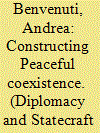

|
|
|
|
|
| Summary/Abstract |
ABSTRACT
In the mid-1950s, Jawaharlal Nehru advanced an alternative approach to regional security, pursuing it enthusiastically. He held that employing diplomacy in accord with the ‘Five Principles’ of peaceful coexistence, regional governments could establish ‘areas of peace’ and achieve ‘collective peace’. China played an essential role in this process, becoming the lynchpin of Nehru’s regional strategy. Although mindful of China’s potentially subversive role in Asia, Nehru downplayed such misgivings, urging Beijing’s commitment to the Principles. By doing so, he endeavoured to ‘create an environment’ where China would find it increasingly difficult ‘to break away from the pledges given’. Furthermore, by supporting China’s participation to the 1955 Bandung Conference, he wished to end Beijing’s isolation and transform India’s giant neighbour into a stabilising regional force. This analysis revisits Nehru’s policy of peaceful coexistence, making a fresh contribution to the study of Cold War India’s external relations. In addition, it explains how such a policy, crucially centred on Sino-Indian rapprochement, took shape and appeared, at least briefly, to make progress and deliver on Nehru’s expectations
|
|
|
|
|
|
|
|
|
|
|
|
|
|
|
|
| 2 |
ID:
170993
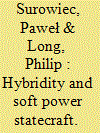

|
|
|
|
|
| Summary/Abstract |
This examination analyses transformations to statecraft accelerated by digital media technologies. This theory-building study moves beyond digitalisation of diplomacy as a means of adapting statecraft to evolving media landscapes, and extends to the governance of soft power capabilities. It challenges static approaches to digital diplomacy and argues for conceptualisations of soft power that account for changes to statecraft. To theorise this dynamic, the concept of ‘soft power statecraft’ and the notion of hybridity in the analysis of ‘GREAT’, Britain’s prominent strategic campaign, reveal trajectories of change elicited by it. The findings, drawn from interviews, policy data, and media artefacts, reveal how ‘GREAT’ embodies a hybridised approach to soft power statecraft at the levels of governance, communicative practices, media landscapes, and cultures. They reveal how these changes translate into statecraft strategies for the articulation of soft power.
|
|
|
|
|
|
|
|
|
|
|
|
|
|
|
|
| 3 |
ID:
170988
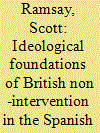

|
|
|
|
|
| Summary/Abstract |
In response to the outbreak of the Spanish Civil War in 1936, the British government adopted and maintained a policy of strict non-intervention throughout the conflict. Previous commentators, to varying degrees, have suggested this policy was largely a product of British hostility towards the Spanish Republic and designed to facilitate a victory for the military rebels who would subdue threats of a communist revolution. This analysis argues that historians have exaggerated British concerns about communism and that Britain saw the Republic as a viable political project that it wanted to succeed. Rather than focusing on British perceptions of only left-wing groups in Spain, this analysis also incorporates perceptions of the extreme right and fascist groups. British concerns about Spain’s political polarisation laid the foundations of the policy of non-intervention, which sought to avert risks of the conflict escalating and solidifying the broader ideological polarisation occurring in Europe during the 1930s.
|
|
|
|
|
|
|
|
|
|
|
|
|
|
|
|
| 4 |
ID:
170987
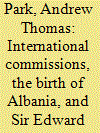

|
|
|
|
|
| Summary/Abstract |
International commissions played an important but overlooked role in Great Power diplomacy during the Balkan Wars of 1912–1913. In establishing the new state of Albania, they served as tools of preventive diplomacy that enabled the Great Powers to avoid a disastrous direct confrontation. This analysis examines the use of such commissions and argues that although they succeeded in preventing Great Power conflict in the short-term, their instrumental use opened new avenues of tension amongst the Great Powers and came at the expense of the national principle. The exegesis highlights how the use of commissions developed in the context of situations of malleable sovereignty that occurred in the wake of the receding Ottoman Empire and suggests that understanding the Great Power commissions of the Balkan Wars can help illuminate the use of similar tools during the Paris Peace Conference of 1919.
|
|
|
|
|
|
|
|
|
|
|
|
|
|
|
|
| 5 |
ID:
170989
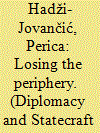

|
|
|
|
|
| Summary/Abstract |
Between the 1935–1936 Abyssinian crisis and the 1938 Munich conference, Britain’s interests in the Balkans and its relationship with other Great Powers limited British policy towards Yugoslavia. This analysis points to a higher level of British influence in Belgrade in the mid-1930s than is usually recognised in the historiography and argues that by not responding adequately to security challenges in the Balkans after the withdrawal of French influence from the region, Britain contributed to a power-vacuum for Germany to fill. As the British position in Southeastern Europe weakened after summer 1936 due to advancing Italian and German penetration, Yugoslavia’s importance grew in the eyes of Foreign Office officials. However, Britain’s position in Belgrade eroded to such a degree by late 1938 that Yugoslavia was no longer willing or able to offer any assistance in the event of war. This examination provides a better understanding of Britain’s interests in Southeastern Europe by highlighting the geo-strategic importance of Yugoslavia and the Balkans as a buffer zone to Central Europe and a flank of Britain’s Mediterranean routes when the balance of power in the continent was disturbed to British disadvantage.
|
|
|
|
|
|
|
|
|
|
|
|
|
|
|
|
| 6 |
ID:
170986


|
|
|
|
|
| Summary/Abstract |
In the Norwegian-Swedish Union, Norway had home rule; the Swedish foreign minister conducted its foreign relations. This fact created the impression that Norway ‘played second fiddle’ in forging its relations with foreign Powers. This analysis contends that the organisation of the apparatus for policy-making secured Norwegian influence and interests in the Union’s foreign politics. It uses ‘concertmaster’ as an alternative metaphor to sum up the role of the Norwegian government in the king’s Norwegian foreign politics during the Union period. Whilst the king of Norway and Sweden’s authority dwindled as politicians in both countries limited royal powers and strengthened those of the Parliaments, the impression of Norway as the foreign political loser increased. In the context of growing European nationalism in the 1890s, the impression of Norway playing second fiddle shored up the radical opposition against the unpopular Union and led to its dissolution in 1905.
|
|
|
|
|
|
|
|
|
|
|
|
|
|
|
|
| 7 |
ID:
170991
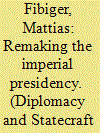

|
|
|
|
|
| Summary/Abstract |
The 1975 Mayaguez incident was a missed opportunity to establish a more democratic American foreign policy. President Gerald Ford managed the crisis seeking domestic and international credibility. But his conception of credibility was more fractured than that of his predecessors, who regarded it as synonymous with militarism, presidential primacy, and secrecy. Ford believed the preservation of American power depended upon a renewal of American democracy, and he was determined to preside over a period of national reconciliation after the traumas of Watergate and Vietnam. His sense of credibility therefore pushed him towards diplomacy in addition to militarism, co-operation with Congress in addition to presidential unilateralism, and openness in addition to secrecy. The antinomies within Ford’s sense of credibility were partly a product of his time, which saw an eruption of public scepticism towards American and presidential power, and partly of his temperament and experience endowing him with a reverence for democratic consensus. Throughout the crisis, Ford wrestled with the contradictions embedded within his sense of credibility. Although he ultimately resolved those contradictions in an anti-democratic direction and deepened the imperial presidency, that outcome was not foreordained.
|
|
|
|
|
|
|
|
|
|
|
|
|
|
|
|
| 8 |
ID:
170992
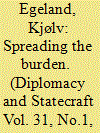

|
|
|
|
|
| Summary/Abstract |
Common knowledge has it that the end of the Cold War allowed the North Atlantic Treaty Organization (NATO) to push the nuclear genie back into the bottle. But whilst NATO members have reduced the alliance’s practical, military reliance on nuclear arms, their commitment to nuclear defence as a shared, symbolic enterprise has in fact grown increasingly explicit over time, with NATO declaring itself a ‘nuclear alliance’ in 2010. The following analysis develops two arguments. First, political responsibility for nuclear defence has shifted from individual member-states to the alliance as such; and, second, this development has been fuelled by member-states’ recurrent need to deflect criticism and adapt to the strengthening of humanitarian and anti-nuclear norms. The pulverisation of responsibility for nuclear defence in NATO has enabled pro-nuclear actors to justify costly nuclear modernisation programmes as acts of ‘alliance solidarity’ whilst exercising rhetorical coercion over advocates of denuclearisation.
|
|
|
|
|
|
|
|
|
|
|
|
|
|
|
|
|
|
|
|
|